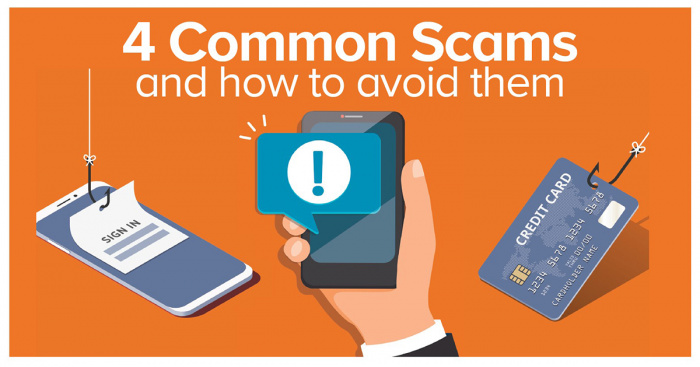
|
IN BRIEF
|
In today’s digital age, online scams have become increasingly prevalent, posing significant risks to individuals and organizations alike. These deceitful schemes range from romance scams and lottery fraud to fake websites and counterfeit goods, all designed to trick unsuspecting victims into revealing personal or financial information. As cybercriminals continually evolve their tactics, it is crucial to remain vigilant and informed about the various types of scams that exist online and how to effectively avoid falling victim to them.
Online Scams Overview
Online scams are deceptive schemes that aim to trick individuals into providing personal information or financial resources. As the digital world continues to expand, understanding these scams, including romance scams, lottery frauds, and fake websites, is vital to ensuring personal safety. This article compares the advantages and disadvantages of online scams, shedding light on the tactics employed by scammers and offering insight on how to protect yourself.
Advantages
While it may seem counterintuitive to discuss advantages in the context of online scams, some aspects highlight the evolution of online security awareness. One significant advantage is the increased awareness among individuals regarding internet fraud. As more people fall victim to scams, others become more cautious and informed, leading to better protective measures.
Moreover, legitimate organizations have stepped up their efforts in educating the public about common fraud tactics. Resources are available, such as online guides and updates about current scams, which help individuals recognize red flags and empower them to take necessary precautions.
Disadvantages
Despite the awareness being raised, the negative impacts of online scams are profound. Victims of scams often experience significant financial losses, ranging from small amounts to devastating sums that can affect their entire lives. Scammers often lure individuals with enticing offers, such as free trials, but these can turn into costly traps.
Additonally, online scams can lead to long-term consequences, including identity theft that poses further risks to an individual’s credit and personal information. The constant threat of being scammed in a digital landscape can create lasting fear, causing individuals to hesitate in making online transactions, which can hinder commerce.
Scammers adapt rapidly to changes in technology, continually devising new schemes that can be difficult to track. Resources such as Scamwatch provide important information, but the sheer volume and variety of scams make it challenging for individuals to stay fully informed.
In conclusion, understanding the complexities surrounding online scams is essential for anyone engaging in the digital world. The balance of awareness and vulnerability highlights the need for ongoing education and vigilance in the face of evolving threats.
Understanding Online Scams
Online scams are deceptive schemes occurring on the internet that attempt to trick individuals into providing personal information, financial details, or even money. Scammers exploit various tactics, using emails and fake websites to lure unsuspecting victims. Recognizing these scams is crucial for protecting yourself and your digital assets.
Types of Online Scams
There are numerous types of online scams currently targeting consumers. Among the most prevalent are romance scams, lottery scams, and fake websites. Fraudsters may also utilize bogus free trial offers to entice victims into sharing sensitive information.
Romance Scams
Romance scams involve scammers posing as potential romantic partners on dating sites. They build emotional connections with victims before requesting financial assistance or personal details. To learn more about common fraud schemes related to online dating, visit here.
Investment Scams
Investment scams promise unrealistic returns on investments. These scams often target people looking to grow their wealth quickly, using high-pressure tactics to get them to invest. Ensuring you conduct thorough research before any investment can help you avoid falling victim.
How to Spot Online Scams
Identifying scams can be tricky, especially since new tactics evolve continuously. However, being aware of red flags can mitigate risks. Common signs include unsolicited messages, requests for immediate action, and offers that appear too good to be true. For a detailed list of scam red flags, check out this resource.
Protecting Yourself from Scams
To protect yourself from online scams, exercise caution when engaging with unfamiliar entities. Always verify the source of emails or messages that request personal information. When making online purchases, use a credit card as it provides an extra layer of security against fraud.
Reporting Scams
If you encounter a scam or fall victim to one, it’s essential to report it. You can report an incident to the FTC and your local authority to help prevent others from becoming victims. For further information on how to report and recover from scams, visit here.
Staying Informed
Staying updated on the latest scams is crucial for online safety. Scammers constantly adjust their strategies, making it vital to keep abreast of trending scams. Resources like NIDirect offer current information on prevalent online scams and consumer advice to help you stay safe.

Understanding Online Scams
In today’s digital landscape, online scams have become increasingly prevalent, targeting unsuspecting individuals and organizations. These scams can take various forms, from fake emails to counterfeit goods, all designed to deceive victims into divulging personal information or financial assets. This article provides insightful ways to identify and avoid becoming a target of these scams.
Common Types of Online Scams
Romance Scams
Romance scams typically involve fraudsters creating fake profiles on dating sites, preying on emotional vulnerabilities. They build relationships with their victims and eventually request money under false pretenses. Always be cautious and skeptical if someone online quickly moves the conversation towards money.
Lottery and Prize Scams
Many individuals fall prey to lottery and prize scams where they receive emails announcing large winnings for contests they never entered. These scams often require personal information or an upfront fee to process the “winnings.” Remember, if it sounds too good to be true, it probably is.
Shopping and Auction Scams
Scammers often set up fake websites that imitate legitimate retailers or online auction sites. They sell products that either do not exist or are counterfeit. Always verify website authenticity and make purchases with credit cards for an added layer of fraud protection.
Red Flags of Online Scams
Recognizing red flags can help you avoid scams. Be wary of messages urging immediate action or requesting personal information. Look for poor grammar and generic greetings in emails, as these can indicate a scam attempt. Additionally, unsolicited attachments or links are often malicious and should be avoided.
How to Report Online Scams
If you suspect that you have encountered a scam, it’s crucial to report it. Websites like the Texas Attorney General provide channels for reporting scams. Always document the details, including screenshots of messages and website URLs, to assist in any investigations.
Staying Informed and Protected
For ongoing updates about the latest scams, it’s important to stay informed. Visit trusted sources such as the FBI or consumer protection agencies that frequently update their information on prevalent scams. Educating yourself is one of the best defenses against falling victim to online fraud.
Additional Resources
Consider checking articles that discuss strategies to defeat scams, like those provided by Outsmarting Scammers. These resources can give you valuable tips and tools to protect yourself and others in the face of digital threats.
Types of Online Scams
| Type of Scam | Description |
| Romance Scams | Frauds that exploit emotional vulnerability to gain trust and money. |
| Lottery Scams | Fraudulent claims that the victim has won a lottery, requiring upfront fees to claim. |
| Free Trial Scams | Fake offers that require credit card information for non-existent products. |
| Identity Theft | The unauthorized use of personal information to commit fraud. |
| Online Purchase Scams | Fake websites selling nonexistent products, often leading to financial loss. |
| Investment Scams | Frauds promising unrealistic returns on investments that are often non-existent. |
| Employment Scams | Fake job listings to collect personal information or money from applicants. |
| Non-delivery Scams | Scams where the victim pays for goods/services that are never delivered. |

Testimonials on Online Scams
One individual recounted a heart-wrenching experience with a romance scam. Initially captivated by messages from what seemed to be a genuine romantic interest, they were drawn into an emotional whirlwind. After months of online chats and exchanges, this person was tricked into sending money, believing they were helping their partner out of a dire situation. It took a long time to realize they had fallen victim to a con artist.
Another story came from a freelancer who was lured into an employment scam. Promised a lucrative contract, the individual was asked to pay upfront for training materials. Despite feeling uneasy, the allure of the job was tempting. Eventually, they lost their money and discovered that the job offer was entirely fictitious, leaving them not only financially hurt but also disillusioned.
A university student shared a cautionary tale about a lottery scam. After receiving an unexpected email claiming they had won a grand prize, excitement turned into dread. The catch? They were required to pay taxes upfront to claim their winnings. Recognizing the classic indicators of a scam, they refrained from engaging further, protecting themselves from what could have been a significant financial loss.
One elderly retiree described receiving numerous bogus emails over the years, targeted at stealing personal information. They quickly learned to identify red flags such as poor grammar, urgent requests for information, and unfamiliar senders. By being vigilant, this individual has successfully avoided falling prey to many online frauds.
A tech-savvy individual shared techniques for spotting fake websites. They emphasized the importance of checking for secure connections and verifying the site’s legitimacy through third-party reviews. This knowledge allowed them to navigate the web safely and avoid scams that have victimized many unsuspecting users.
Understanding Online Scams
In today’s digital age, online scams have become increasingly prevalent. These schemes can take on various forms, including romance scams, lottery frauds, and fake websites designed to deceive unsuspecting victims. By recognizing the common tactics used by scammers and understanding how to protect yourself, you can navigate the online world more safely and avoid falling victim to these malicious activities.
Common Types of Online Scams
Romance Scams
One of the most distressing forms of online fraud is romance scams. Here, scammers create fake profiles on dating sites, building emotional connections with victims before requesting money for various fabricated emergencies. It’s crucial to be wary of anyone who quickly seeks financial help or seems too good to be true.
Lottery and Prize Scams
Lottery scams often inform recipients that they have won a huge prize, but they must first pay a fee or provide sensitive information to collect their winnings. Never respond to such unsolicited messages, as legitimate lotteries will not ask for money upfront.
Fake Websites and Online Shopping Scams
Shopping online can come with risks if you’re not careful. Fake websites that mimic trusted retailers can trick you into purchasing counterfeit goods or nothing at all. Always confirm the site’s authenticity before making a purchase, and look for customer reviews to verify credibility.
Recognizing Red Flags
Identifying red flags can significantly aid in preventing online scams. Be suspicious of any communications that urge immediate action or seem overly aggressive in their language. Scammers often create a sense of urgency to provoke hasty decisions, so take your time and assess the situation carefully.
Tips for Protection Against Online Scams
Use Secure Payment Methods
When shopping online, always opt for secure payment methods, such as credit cards. These provide an added layer of protection against fraud, as they allow you to dispute charges if something goes wrong. Avoid using wire transfers or sending money through apps to unknown individuals, as these are not easily recoverable.
Verify Sender Information
Before responding to emails or messages, take a moment to verify the sender’s information. Scammers often use spoofed email addresses or fake profiles to appear legitimate. Check for spelling mistakes in email addresses and scrutinize any links before clicking on them.
Educate Yourself on Scams
Stay informed about the latest scamming techniques and schemes that target consumers. Regularly visiting trusted consumer protection websites can provide valuable insights and advice to help you recognize and avoid potential threats.
Reporting Online Scams
If you encounter a suspected scam, reporting it can help other potential victims. Document all communications and report the scam to relevant authorities, such as the Federal Trade Commission (FTC) or your local consumer protection agency. Your efforts could play a critical role in preventing further fraud.
By being vigilant and informed about the risks of online scams, you can protect yourself from falling victim to these deceptive practices. Keep yourself educated, practice caution when interacting with unknown sources, and always prioritize your digital safety when navigating the online landscape.

Understanding Online Scams
In today’s digital age, online scams have become increasingly prevalent, targeting individuals and businesses alike. The range of these fraudulent schemes is vast, including romance scams, lottery scams, and deceptive websites that lure unsuspecting victims. It is critical to remain vigilant and informed about the various types of fraud that exist online.
Common tactics employed by scammers include the use of misleading emails, fake offers for free trials, and counterfeit goods. These schemes are designed to steal personal and financial information, often resulting in severe financial losses for the victims. Identity theft is another significant concern, where scammers impersonate individuals to access sensitive data.
To protect yourself from falling victim to these scams, it is essential to approach any unsolicited messages with skepticism. Avoid clicking on suspicious links and verify the sender’s authenticity before engaging. When making online purchases, using a credit card can add an additional layer of security against fraudulent transactions.
Stay informed about the latest scams by following updates from consumer protection agencies. Recognizing the red flags of a scam, such as unsolicited communications or offers that seem too good to be true, is vital. Furthermore, reporting any scams encountered can help authorities take action and protect others from similar threats.
Ultimately, by educating oneself about the dynamics of online scams and implementing protective measures, individuals can better safeguard their personal information and financial resources. Awareness is the first step in reducing vulnerability to cybercrime and creating a safer online environment for everyone.
FAQ on Online Scams
What are online scams? Online scams are deceptive schemes designed to trick individuals into divulging personal or financial information, or to steal their money.
What are the most common types of online scams? Common types of online scams include romance scams, lottery scams, fake websites, and various forms of fraud targeting consumers through emails and websites.
How can I spot an online scam? Be vigilant for red flags such as unsolicited messages urging immediate action, deals that seem too good to be true, and requests for personal information.
What should I do if I think I’ve encountered a scam? It’s important to report the scam to relevant authorities and, if necessary, take precautions such as monitoring your financial accounts and changing passwords.
How can I avoid becoming a victim of online scams? To avoid scams, always verify the legitimacy of websites and offers, use secure payment methods, and refrain from sharing personal or financial information with unknown sources.
Are there any known internet safety tips? Always use credit cards for online purchases as they provide an extra layer of protection against fraud, and be cautious when clicking on links or opening attachments in emails.
What actions should I take if I fall for a scam? If you fall victim to a scam, immediately contact your bank or credit card issuer, report the scam, and take steps to safeguard your personal information.
